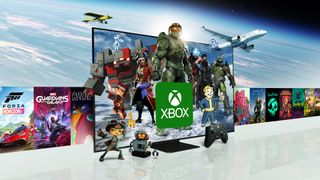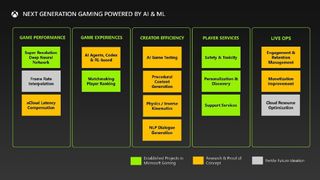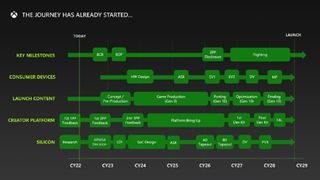What comes after Xbox Series X? Microsoft's 2028 next-gen console plans revealed
Microsoft leak shows ambitious plans for cloud integration in next Xbox console

Today's massive Microsoft FTC leak revealed an early roadmap for Microsoft's next gaming console – not the mid-gen Xbox Series X refresh, but the all-new next-gen hardware tentatively scheduled for 2028.
In unredacted presentations dated May 2022, Microsoft describes the next Xbox console as the keystone for its plan to double its gaming revenue by 2030 and "reach industry leadership, outside of China."
The next Xbox is said to double down on cloud integration, enabling "larger, richer, more dynamic open worlds with increased technical demands" as well as "cloud hybrid games" delivering "new game genres and types, unlocked through player growth and technical innovation."
This "hybrid compute" framework is a running theme for Microsoft's early draft, which predicts the "full convergence" of Microsoft's unified gaming vision in 2028. A timeline on one slide notes the advancements of each generation of Xbox hardware, putting this convergence into context.
- Xbox, 2001: Standalone hardware and software
- Xbox 360, 2005: Dev tooling
- Xbox One, 2013: Operating system and software development kit convergence
- Xbox Series X | S, 2020: Cloud-optimized hardware, unified game development kit
- "Next Gen," 2028: "Full convergence"
The top-level view of what I'm calling the NextBox is: "Not a console generation. An ecosystem generation." This lines up with the increasingly broad Xbox platform, now spread across consoles, PC, Game Pass, and cloud streaming. Looking at 2028 to 2030, Microsoft is grouping browser, mobile, smart TVs, low and high-end PCs, consoles, cloud consoles, handheld devices, and streaming sticks into one big ecosystem under its Azure cloud umbrella.
"Our vision: develop a next-generation hybrid game platform capable of leveraging the combined power of the client and cloud to deliver deeper immersion and entirely new classes of game experiences," the leaked presentation reads. "Optimized for real-time gameplay and creators, we will enable new levels of performance beyond the capabilities of the client hardware alone."
How, exactly, will the cloud benefit games beyond making them playable across a range of devices? Microsoft flags a few points of interest:
Sign up to the GamesRadar+ Newsletter
Weekly digests, tales from the communities you love, and more
- Graphics innovation: next-gen DirectX raytracing, dynamic global illumination, machine learning-based super resolution
- AI and machine learning for optimized performance, as well as features like dialogue or procedural content generation
- Development tools that make it easier to port games to other platforms
One of the more interesting slides groups features by type and state of development, with some being established projects, most being in the research stage, and two – frame rate interpolation and cloud resource optimization – labeled as "fertile future ideation" territory.

While this next-gen roadmap is heavily subject to change, it does notably include dates for a few key development milestones that support a 2028 release. For starters, Microsoft hopes to have early dev kits out in 2027, with a final dev kit seemingly targeting the end of the year. Talks with third party developers appear to be slated for early 2026.

I'm especially intrigued by the "launch content" pipeline here. Concepting and pre-production for this area would start as early as this year, with games for the Xbox Series X still being the priority until 2026, when porting and optimizing for the still-unnamed "Gen 10" system starts to bleed in.
Microsoft has predicted a 2028 launch for its next console as well as the PS6 before, so while this presentation is so soft you could spread it on toast, it's still a valuable point of reference – and one that we absolutely are not supposed to know about.
The big Xbox leak also revealed Oblivion and Fallout 3 remasters apparently in development.
Austin freelanced for the likes of PC Gamer, Eurogamer, IGN, Sports Illustrated, and more while finishing his journalism degree, and he's been with GamesRadar+ since 2019. They've yet to realize that his position as a senior writer is just a cover up for his career-spanning Destiny column, and he's kept the ruse going with a focus on news and the occasional feature, all while playing as many roguelikes as possible.
Most Popular





